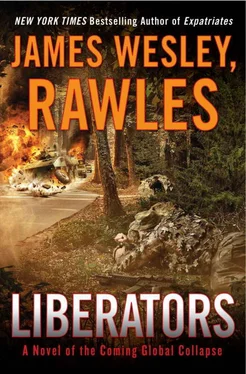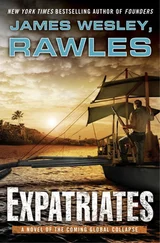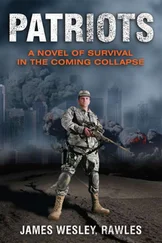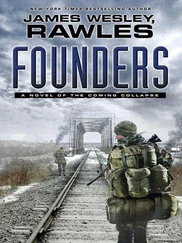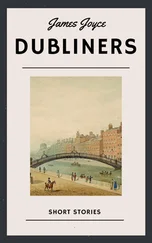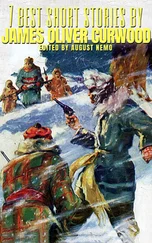Dustin, Joshua, Megan, and Malorie started to make plans for resistance in the region even before the decrees banning most firearms were issued by the ProvGov. Since Bradfordsville was relatively close to Fort Knox, they realized that they would have to be very cautious. They thought that covert sabotage would be the most effective use of their time, with only moderate risk.
Joshua started out by building a hidden compartment in his rental house to hold all of their guns and ammunition. This wall cache was put in the plumbing wall between the kitchen and bathroom, so that anyone searching with a metal detector would assume that it was plumbing pipes that were causing false returns. Then he helped Dustin build a similar cache in his house.
Realizing that their former positions with the NSA might give them a high profile with the ProvGov’s nascent Gestapo, Megan and Joshua asked Dustin if he could somehow help them create fake IDs. Dustin spent several evenings looking through the mysterious Jonestown Footlocker. He ended up finding three Georgia driver’s licenses that were good facial matches for Megan, Malorie, and Joshua. Megan would be Stacy Titus, age twenty-five; Malorie would be Carrie Lynn Peters, age twenty-three, and Joshua would be Joseph Kwok, age twenty-four. (Joshua thought this was ideal, since Kwok was a fairly common surname in both Korea and China.)
The ages on the false IDs were all too young, the body weights were all too high, and the eye color for Megan and the hair color for Malorie were both mismatches. But since the twenty-first century was the era of rapidly changing weight and hair color, and tinted contact lenses, those discrepancies could all be explained away.
In the same search, Dustin also found an ID that would be a good match for himself, if he grew a beard. The crucial thing was facial features, and for those, he had found quite good matches. As long as they memorized the details on their fake driver’s licenses, they could get past at least cursory ID checks, such as roadblocks.
Because the IDs in the footlocker had never been cataloged, it would not be noticed that the four driver’s licenses were missing. Since they were already known in Bradfordsville by their real names, Dustin suggested that they keep their false IDs hidden, just in case of any contingency.
Western Canada—February, the Third Year
Soon after the French arrived in each province, a decree went out that banned most firearms. Western Canada felt the impact of the Ottawa government’s edicts much later than the eastern provinces. In their first few guns raids in Vancouver and Fort St. John, the RCMP took six officer casualties and netted just eight guns. So the RCMP suspended any future raids in British Columbia “for fear of officer safety.”
The RCMP’s failure to enforce the UN’s gun ban made the UNPROFOR commanders furious. Despite some threats and posturing, they did nothing. They recognized that they needed the cooperation of the RCMP to successfully occupy western Canada, and that cooperation was marginal, at best. Although they had access to the same gun registration records, UNPROFOR didn’t even attempt to go door-to-door, searching for guns. They preferred to make proclamations and to send out notices. These public notices threatened the citizenry with long prison sentences, deportation, and even the death penalty for noncompliance.
The Canadian government had attempted to create a universal long-gun registry when the Firearms Act became law on December 5, 1995. However, it took until 1998 to develop a system to issue licenses and require buyers to register long guns. As originally enacted, by 2001 all gun owners were required to have a license and, by 2003, to register all of their rifles and shotguns. But there was massive noncompliance and loud complaints, especially in the western provinces.
The registry’s database had some huge flaws. The consensus was that the registry was unworkable, that it had no impact on crime, and that it was outrageously expensive. (The administrative costs were estimated at $2.7 billion in 2012.) With the passage of bill C-19 in 2012 the registration scheme was abandoned, and the registry records were destroyed. So even if UNPROFOR was willing to take the casualties, they still would not have known where to find all of the guns in Canada.
The UNPROFOR occupation smothered every aspect of life in Canada. Most public meetings were banned. Any public protests were quickly broken up, and the leaders jailed. Freedom of speech and press were history. Government censors were in every newsroom. Amateur, CB, and marine band radios had to be turned in to the authorities. (After a public outcry, the marine band radio confiscation was almost immediately rescinded, for the safety of saltwater fishermen and crabbers.) While some dutifully turned in their radios, many of those turned in were nonfunctional transceivers with burned-out finals or other electronic problems, or they were earlier-generation spares. Nearly everyone retained their good gear but kept it hidden.
UNPROFOR had underestimated the growing resistance, characterizing the resisters as “bandits,” “a few scattered anti-Francophone malcontents.” They also misread the mood of the populace in western Canada. The citizens at first appeared happy to see “help from France” with the arrival of fuel tankers by road in Kamloops and by sea in Vancouver. But when infantry troop ships arrived at Vancouver and Prince Rupert, passive resistance began almost immediately. The French tried to use le gant de velours (“the velvet glove”) approach at first, to cast themselves as the Nice Guys. But the passive resistance grew and soon morphed from vehicle sabotage to sniping.
UNPROFOR was slow to react, but when it eventually did, it came down with a fist of iron. Many of the French counterinsurgency tactics dated back to their experience in Algeria in the 1950s. As resistance grew, the French tactics became more brutal, with torture of prisoners becoming commonplace. Once the serious shooting started, the velvet glove was removed from the iron fist.
The French army had been freshly emboldened by massacring illegal aliens protesting in France, with impunity. Their Foreign Legion troops were used primarily to police Quebec, while the French-born soldiers were used in the other provinces, where English was the predominant language. These deployments both fit in with the UN’s strategy of using unsympathetic troops to quell local uprisings.
Calling it your job don’t make it right, boss.
—Paul Newman,
Cool Hand Luke (1967)
The McGregor Ranch, near Anahim Lake, British Columbia—May, the Third Year
The small meeting at the McGregors’ house started with Phil recounting the chatter that he’d heard on the shortwave radio. In addition to Alan, Claire, Ray, and Phil, there was also Stan Leaman, a twenty-three-year-old bachelor from an adjoining ranch. Stan was a descendant of one of the earliest settlers of the region. Most of Stan’s siblings had moved to Canada’s oil sands region, following opportunities with the petroleum boom. So Stan had to hire laborers to help him operate his raw-milk dairy farm.
Stan rode up to the McGregor ranch house on his big gelding one afternoon and said to Alan, “If you’re planning something to fight back against these UN clowns, then count me in.”
The five of them formed an independent resistance cell that would later be known as Team Robinson. They chose the name in memory of the FOB in Afghanistan where Ray and Phil had first met each other. Their first formal meeting was in May, just after news came to them of some mass arrests in Edmonton. Stan arrived wearing his usual green-and-black-checkered flannel jacket. After Stan had joined them in the living room, Phil adopted a businesslike tone and said, “We obviously need to do something when UNPROFOR arrives in British Columbia. But even before then, we need to train, organize—and of course cross-level equipment and ammunition. We need to cache a lot of gear. Not only will they be searching houses, but they’re also going to lock down the towns tight , with checkpoints. So we need to gather intelligence, take stock of what we have available, and pre-position some gear so that we can use it to our best advantage.
Читать дальше
